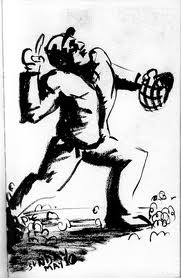BriefConsulting 1.5: Outing The Fix

I thought my challenge was a common one, especially for writers. I’m a hesitant joiner, though I’m absolutely convinced that community produces by far the best outcomes. So, when I’m invited to a writer’s retreat like this one, I spend at least the day before I leave trying to talk myself out of attending. I’m usually better at this than I was this time, so I’d shown up. Then, in this last session, I stood up.
Once en-grouped, I explained my experience in greater detail, then the inquisitors began. I noticed a twinge of thrill in my chest as we began, a sense that this session just might fix my life-long reluctance, and this possibility felt really, really good. Maybe I could fit in instead of force-fitting in.
The first inquisitors might have sensed my feelings because their questions seemed distinctly solution-focused, as if my difficulty might be fixed should I experience some insight or discover some underlying pathology. Had I ever considered that I might be Aspergers-y? Yup. Whys seemed prominent. Why do I do this? Why did I do that? One empath tried to guide me down into underlying fears, as if discovering the source of my shyness might render me more personable. These were loving, hopeful inquiries, but I found myself incapable of responding to many of them.
Finally, one questioner noted that her bullshit detector was going off. I heard the implication that I might be bullshitting, but deflected by noting that her detectors was hers. Might mean I was BSing, but then again, maybe not. Maybe we were innocently BSing each other. I took back the talking stick, explaining that my challenge, my obstacle, might better qualify as a feature than as a problem. I’ve always been this way. Maybe my challenge could be to better cope with the way things are rather than to try changing the way I’ve have always been. Just maybe.
The quality of the inquisition shifted shortly thereafter, and when the focus shifted from helping me gain insight to harvesting the inquisitors insights, transcendence ensued.
A subtle but pervasive dance begins with any consultation. The possibility of permanently fixing something barges in to sit in the Daddy Bear chair, dominating the room. This sense of possibility influences both the one suffering the difficulty and the one tasked to help. Rescue fantasies and rescued delusions dominate unless deliberately declared. “I’m not here to fix you.” “I don’t expect you to fix me.”
These are stunning declarations, contrary to the DNA of standard consulting practice, the rough equivalent of announcing that we won’t be keeping score. If the purpose is to gain insight, no root cause need be identified, no treatment prescribed. First, to wade through the bull rushes and quicksand, accepting the difficulty as the way it is, the way it most certainly seems to be. Then, perhaps, to find some swimmable water. Just accepting that what’s there IS there seems the first, sometimes nearly insurmountable challenge, whatever the reported difficulty.
It’s energizing to inquire without the implicit expectation that a fix is impending, for it suggests that perhaps the client isn’t broken and that the consultant needn’t engage in that inevitably demeaning skinned knee patching that quietly implicates the client as having somehow screwed up. That initial, naive hopefulness for fixing and to be fixed wears poorly, and I shortly notice a sour stomach, a headache, or yawning exhaustion quietly settling in. Before the ensuing slog, a quick turn might transform the surgery into inquiry again, leaving no scars and requiring no painful recovery time.
I’m outing the fix. If the purpose really is to fix, the engagement will be long and contentious, probably unsuccessful. If the purpose focuses upon gaining insight to gain mobility—getting unstuck—, perhaps acceptance of the way things are qualifies as fix enough for any change to start.
Where did this inquiry end up? What insight did I gain? I stood up again, reporting that I’d discovered that I had every right to be terrified of engaging in community, just as I was justifiably terrified of falling in love or writing a book, for these are cans of worms-opening experiences. No old status quo can persist in the face of love, writing, or community, so I should feel the backwards pull when considering forward movement. This hesitation renders me more mindful, perhaps even better preparing me for the experience. I can always talk myself out of these engagements, and will continue to, no doubt. And perhaps I will retain this small insight I gained when catching myself failing to fix this noble, eternal feature of my creative life.
If a possibility doesn’t terrify me, it probably doesn’t hold all that much potential.
©2012 by David A. Schmaltz - all rights reserved


